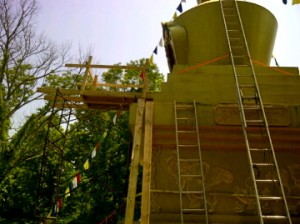
An excerpt from a teaching called Dharma and the Western Mind by Jetsunma Ahkon Lhamo given on January 29, 1989
Adapting Dharma for Westerners is not difficult if you understand what our needs are. The first thing that a Westerner has to do is to become stable in this path. You have to remain stable and you have to remain stable for the right reasons. I have seen old time practitioners that have seen the best Lamas and had the best opportunities and the most glorious teachings, but I am not impressed with the stability of their path and I feel that the reason for that is that they have not come to the point where they have really cultivated a gentleness of mind. They haven’t really cultivated the necessary fire in the heart that keeps everything going. They haven’t lit that dynamo that makes them remain passionate about loving.
Sometimes I am disappointed in when I see old time practitioners doing the Dharma talk and walking the Dharma walk and spouting this name and knowing that term but their hearts are unchanged. There is a hardness there. The most tragic thing about that is that even though they are hot and heavy on the path now they may not remain firm on the path. And time has born that out. There are many Western Dharma practitioners who were really on and now they are really off. I think that the reason why this happens is because they did not take the time to build a foundation based on compassion. We cannot consider that it is a baby teaching. I talk about bodhicitta and compassion all the time. If bodhicitta, which is the term for compassion, were ice cream you would come here and you would get a different flavor every week. That is how I teach. And I teach it as many different ways as I can. I try to be creative and sometimes I pull rabbits out of hats and sometimes I whisper it and sometimes I shout it and sometimes I give it to you to read, but it is always about Bodhicitta. It is always about compassion, it is always about love in some form or another.
I really have had old time Dharma students say, “Hey I have had Bodhicitta already, and I am tired of Bodhicitta.” I am so sad when I hear that because if you can get tired of that subject then you don’t know it at all. You think that it is a baby subject yet it is the very union of the wisdom of realizing the emptiness of self-nature and the compassionate self that is truly the awakened mind. There is no time when you are finished learning about compassion. There is no time when you are finished learning about love.
Westerners who have been to college, to university and have papers are the worst problem we have in this country when it comes to practice, because we think that having got papers we don’t need to be learning about this simple stuff. We say, “I need the real teachings. Give me some Dzogchen. Give me some heavy stuff. I want the real stuff, because I am an American and I can deal with it.” The problem is that as Westerners, no matter who we are, if the mind is not prepared, it is like the ground not being cultivated. You drop the seed and it goes plunk on the top and if our minds are not gentled and deepened we go plink. We may be able to memorize a wonderful Dzogchen teaching, we may be able to read the text but we are still plinking merrily away. We have to have these foundational teachings and they have to be with us always. There is never a time, no matter how advanced you are that you should forget that the greatest Dzogchen teaching, the most pure and pristine understanding of the Nature of Mind is an understanding of the nature of compassion. The most pristine, achingly beautiful understanding of the Primordial Wisdom State is the awakening to love. There is no difference: the two of them are inseparable. You can’t have one without the other. And you may think to yourself, “What comes first the chicken or the egg? Can’t I learn to love after I am wise already?” I don’t think so because really the mind has to be prepared for these precious deeper teachings. It has to be gentled.
There is a confession that His Holiness Dudjom Rinpoche gave to us and the translation that I have says, “That my mind is as hard as horn.” And I think about that all the time because at any stage it is possible for the mind to become hard as horn, to become so impressed with its prowess in playing with Dharma terms, to become so impressed with how we can sit straight when we meditate, to become so impressed with how good we live and how sorry we are for every one else, to become so impressed that we are hard. It is important for us as Westerners and as part of the human family to cultivate gentleness so that we can truly accomplish Dharma.
©Jetsunma Ahkön Lhamo



